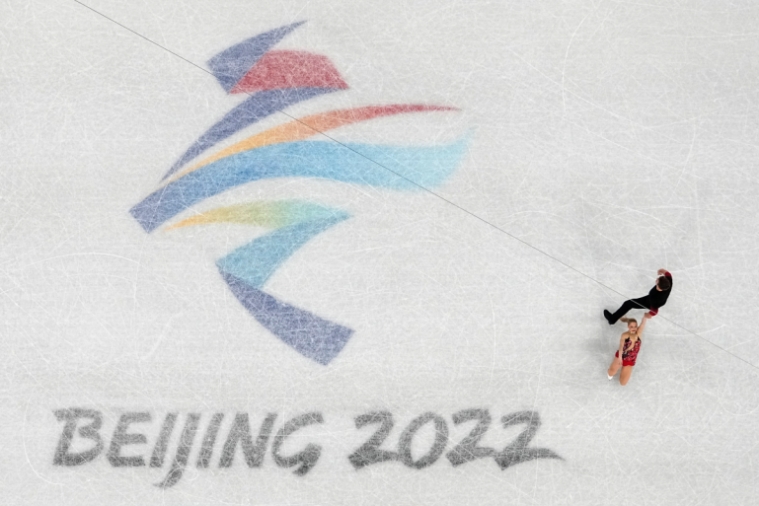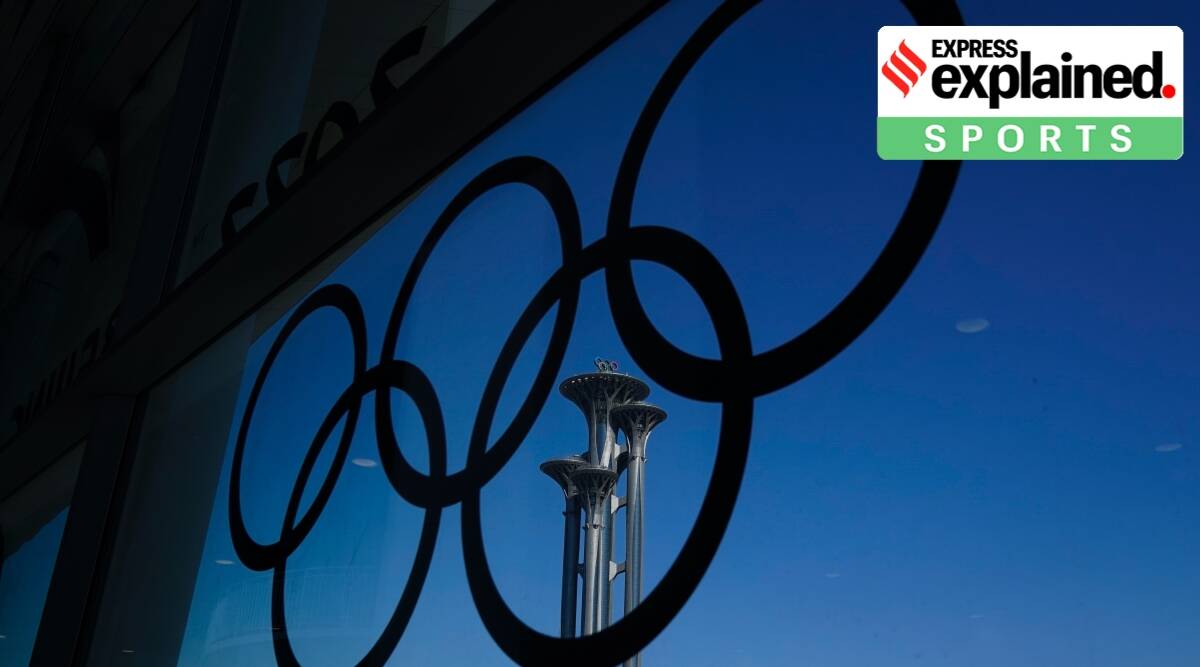The Beijing Olympic Tower is seen from the Main Media Center ahead of the 2022 Winter Olympics, Friday, Feb. 4, 2022, in Beijing. (AP Photo/Ashley Landis)
Thank you for reading this post, don't forget to subscribe!Shared News: February 4, 2022 1:37:45 pm
On Thursday, India announced a diplomatic boycott of the Beijing Winter Olympics, which get underway on Friday.
By doing so, India has joined a growing list of countries that will not send government delegations to the Chinese capital for the Winter Olympics. In December, the United States had announced a diplomatic boycott of the event. The United Kingdom, Australia, New Zealand, Canada, Japan, New Zealand and the Netherlands, among others, followed the US’s lead and made a similar decision.
While the 2008 Olympics were seen as China’s coming-out party, the Winter Games have been dogged by controversies, ranging from the diplomatic boycotts to the safety of one of China’s top players and concerns over the privacy of the visiting athletes.
What is a diplomatic boycott?
It simply means these countries will not send official government delegations to Beijing during the Games. Given the scale of the Olympics, high-ranking officials from a country’s government often travel to the Olympics. These officials are often labeled as the ‘VIP visitors’.
Last year, US First Lady Jill Biden led an American delegation to the Tokyo Olympics. At the 2018 Winter Games in South Korea, American vice-president Mike Pence was present. There is no obligation for a head of state or high-ranking diplomats to visit the host nation.
Does a diplomatic boycott affect athletes’ participation?
It doesn’t. Unlike the 1980 Moscow Olympics and 1984 Los Angeles Games, a period when thousands of athletes did not participate due to the prevailing political situation at the time, athletes and officials from all countries will continue to take part in the Winter Olympics in Beijing unhindered.
One of the key differences between then and now is the commercial angle. The Olympics are now are a billion-dollar enterprise and a complete boycott could cost athletes, broadcasters and the organisers a fortune. A diplomatic boycott is a token protest that has no impact on the sporting spectacle.
So far, no athlete has withdrawn from the Beijing Games, and India will continue to be represented by just one athlete, alpine skier Arif Khan.
Doordarshan’s decision to not telecast live the opening and closing ceremonies of the Winter Games will impact the TRP of the event. The announcement had come after the Indian government refused to send its envoy to the opening or closing ceremonies.
Why have the Beijing Winter Games been so controversial?
In India’s case, the boycott was announced after a Chinese soldier involved in the Galwan incident was made an Olympic torchbearer.
The Western countries, led by the US, made the diplomatic snub over China’s alleged treatment of the Uyghur Muslims and human rights issues.
Some countries like Austria, New Zealand, Slovenia, Sweden and the Netherlands have cited pandemic-related risks for not sending government officials.
France, the hosts of the 2024 Summer Olympics, has been against a boycott. The BBC quoted French President Emmanuel Macron as saying: “I don’t think we should politicise these topics, especially if it is to take steps that are insignificant and symbolic.”
Has the Peng Shuai issue also contributed to the boycotts?
Yes. The US and Australia cited it as one of the reasons, while German ministers, too, said they won’t attend the Games in response to the alleged treatment meted out towards Chinese tennis star Peng Shuai.
Peng Shuai had accused a high-ranking communist party member, Zhang Gaoli, of sexually assaulting her. However, moments after Peng Shuai made her allegations on Chinese social media, the posts were taken down and she disappeared from public view for days, sparking concerns about her safety. The International Olympic Committee chief, Thomas Bach is expected to meet Peng Shuai on the sidelines of the Winter Olympics.
China has said it is “not bothered at all” by the boycotts. In a tweet following the US’s announcement on Monday, the Chinese Embassy in Washington said: “In fact, no one would care about whether these people come or not, and it has no impact whatsoever on the #Beijing2022 to be successfully held.”
Global Times, China’s state-run newspaper, dismissed Australia’s decision as “immature, arrogant and stupid” while the government said the boycotting countries will “pay a price”.
“The United States, Britain and Australia have used the Olympics platform for political manipulation,” Wang Wenbin, a spokesperson at the Chinese foreign ministry, said at a press conference. “They will have to pay the price for their mistaken acts.”
Unlikely. China has said it was anyway not going to invite delegations from other countries because of the pandemic-related restrictions. None of the major sponsors or broadcasters have so far pulled out, apart from Prasar Bharti, who have said there will be no official broadcast.
But, as things stand, most top athletes are already in Beijing. In fact, the US has even said it will fully support its athletes even as they diplomatically boycott the Winter Olympics.

Alexa Knierim and Brandon Frazier, of the United States, compete during the pairs short program figure skating competition at the 2022 Winter Olympics, Friday, Feb. 4, 2022, in Beijing. (AP Photo/Jeff Roberson)
Will these boycotts have any impact going ahead?
There are fears that the move led by the US could provoke China to do the same. The US and Australia are the hosts of the Summer Olympics in 2028 (Los Angeles) and 2032 (Brisbane), respectively. The US is reportedly looking to stage the Winter Olympics as well in the near future. And with many key Olympic sponsors being Chinese, it could get tricky for the US bid.
Are the Games expected to witness protests by athletes?
Athletes have been warned not to indulge in acts of demonstration during the Olympics by their own governments as well as the Chinese officials.
On Thursday, US House Speaker Nancy Pelosi told the American athletes “do not risk incurring the anger of the Chinese government because they are ruthless”, according to Bloomberg.
A day earlier, Yang Shu, deputy director-general of Beijing 2022’s International Relations Department, was asked during a virtual briefing about concerns for athletes if they speak out about human rights issues. Al Jazeera quoted Yang as saying: “Any expression that is in line with the Olympic spirit I’m sure will be protected and anything and any behaviour or speeches that is against the Olympic spirit, especially against Chinese laws and regulations, are also subject to certain punishment.”
Some countries have also asked their athletes to leave their main devices at home and use burner phones at the Games to avoid privacy breaches.




